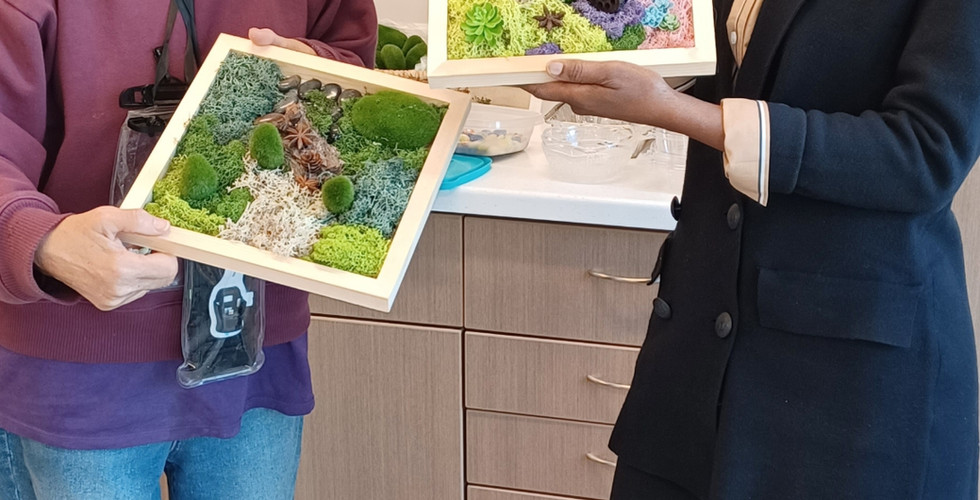The Art of What We Do (Part 3 of 5)
- Kashia Knight

- Aug 19, 2025
- 3 min read
Updated: Oct 13, 2025

Have you ever wondered what goes on behind the scenes at the Arts Council?
Over the next four weeks, we’re pulling back the curtain to share how we serve Fayetteville and Cumberland County through creative programs, community connections, and vibrant visual arts experiences. Whether you're strolling through our downtown gallery, visiting from out of town, or just getting to know the cultural side of Fayetteville, this is your guide to what we really do — and how it all comes together.
This week, we spoke with our Arts Education Manager, Kashia Knight and our Director of Community Engagement, Sarah Busman .
How do you reach members of the community?
At the Arts Council, we believe Arts Education should reach people at every stage of life, and we’re committed to fostering lifelong learning through the arts. Through our Artists In Schools (AIS) program, we connect with the youngest members of our community by working closely with Cumberland County Schools to bring in artists who meet county education standards, ensuring that students across the district have access to high-quality, culturally relevant arts experiences right in their classrooms.
On the other end of the spectrum, our Arts Resources for Elders (ARE) program brings the arts to older adults through partnerships with the Bill Crisp Senior Center and Senior Center East. These centers are dedicated to improving quality of life for seniors, and we believe regular engagement with the arts plays a powerful role in achieving that mission.
Who are some of the community members that you serve?
Our Arts Education programs serve both young learners and older adults across Cumberland County. AIS serves students at 65 schools across Cumberland County, including 77% of all Title I schools. That means more than 17,800 students are gaining access to Arts Education regardless of their background or school’s resources. We also serve the 13.3% of Cumberland County residents that are 65 or older through ARE. As one teaching artist put it, “A 70-year-old man pulled me to the side after to let us know we were doing something amazing. It felt good for someone from an older generation to tell us that we were inspiring.”
A collective of 256 teaching artists from our Teaching Artist Directory deliver programming in theatre, storytelling, music, dance, and visual art. And while we focus on serving students and seniors through these programs, we’re also here for the artists themselves. All of our teaching artists are compensated, and we’re proud to support their work as they share their gifts with our community.
How do you receive funding?
Our Arts Education programs are made possible through a combination of public and private support, including funding from Cumberland County Schools, county and state contracts, the North Carolina Arts Council, United Way, and private foundations. Funding from our county contract also allows us to compensate the teaching artists who bring these programs to life.
That said, public funding and grants only go so far. Individual gifts play a vital role in expanding our reach and ensuring that students and seniors continue to experience the transformative power of the arts. We invite community members to partner with us and make a meaningful impact through their generous gifts.
How do you impact the local economy?
Arts Education programs stimulate the local economy by expanding our Teaching Artist Directory and increasing employment opportunities for artists. Many of our teaching artists are also contracted for other community events and festivals, such as the International Folk Festival, further boosting local cultural tourism and putting Fayetteville on the map as an arts destination.
Is there anything else people should know about Arts Education at the Arts Council?
Arts Education is a year-round commitment, and we are working to place teaching artists in even more schools and community centers. We’re also continuing to evolve our offerings to meet the needs of a growing community by investing in professional and artistic development for artists. Workshops in grant writing, portfolio building, and marketing remain essential, as both emerging and established artists rely on these opportunities to advance their careers and make a greater impact on students and the community at large.
Want to help support the arts?
Give today and help us continue making an impact on arts and culture here in Fayetteville | Cumberland County.
For regular updates on the Arts Council, follow this organization on Facebook (@ArtsCouncilFay) or Instagram (@artscouncilfay).
























Comments